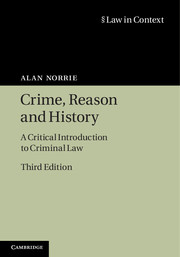Book contents
- Frontmatter
- Dedication
- Contents
- Preface to the third edition
- Preface to the second edition
- Preface to the first edition
- Table of cases
- Table of statutes
- Prologue: A brief history of the ancient juridical city of Fictionopolis
- Part I Context
- 1 Contradiction, critique and criminal law
- 2 The historical context of criminal doctrine
- Part II Mens rea
- Part III Actus reus
- Part IV Defences
- Part V Concluding
- Bibliography
- Index
2 - The historical context of criminal doctrine
Published online by Cambridge University Press: 05 October 2014
- Frontmatter
- Dedication
- Contents
- Preface to the third edition
- Preface to the second edition
- Preface to the first edition
- Table of cases
- Table of statutes
- Prologue: A brief history of the ancient juridical city of Fictionopolis
- Part I Context
- 1 Contradiction, critique and criminal law
- 2 The historical context of criminal doctrine
- Part II Mens rea
- Part III Actus reus
- Part IV Defences
- Part V Concluding
- Bibliography
- Index
Summary
The high and paramount importance of the Criminal Law consists in this consideration, that upon its due operation the enforcement of every other branch of the law … depends. [And] there is [no branch] which is so capable of being made intelligible to all classes of persons, or which, in its relations and bearings, is calculated to excite greater attention and interest – none, the knowledge of which can tend more effectually to convince all ranks of Your Majesty’s subjects that the laws are founded on just principles, having regard to the protection of all, and equally binding on all, and consequently to impress the duty and induce the habit of prompt obedience.
(Criminal Law Commissioners, 1843, 4)It was easy to claim equal justice for murderers of all classes, where a universal moral sanction was more likely to be found, or in political cases, the necessary price of a constitution ruled by law. The trick was to extend that communal sanction to a criminal law that was nine-tenths concerned with upholding a radical division of property.
(Hay, 1977, 35)Introduction
In the preceding pages, I have considered the orthodox claim that the fundamental bases of the criminal law are principles of rational legalism and individual justice. Although this claim is made in the writings of academic and practising lawyers, we have also seen it negated by these same people. This raises the obvious question, ‘Why?’ An explanation of this phenomenon must go deeper than the principles of law themselves, to a level at which we can understand the co-existence of principle and its negation within the law. As Horwitz has claimed, to go deeper involves going into history. The Prologue is a starting point. It tells of an imaginary world which, I suggest, corresponds roughly to the historical world of which we are a part. English society (along with most of continental Europe) had its own reactionary, bloody penal system, which gave way to an ‘enlightened’ project of legal reform in the second quarter of the nineteenth century. But this project of legal reform was not without its contradictions, and a more thorough analysis of the most important developments shows this to be so. That is the task of this chapter, which attempts to substantiate the sketch of the Prologue and provisionally to indicate its significance for modern criminal law doctrine.
- Type
- Chapter
- Information
- Crime, Reason and HistoryA Critical Introduction to Criminal Law, pp. 19 - 38Publisher: Cambridge University PressPrint publication year: 2014



